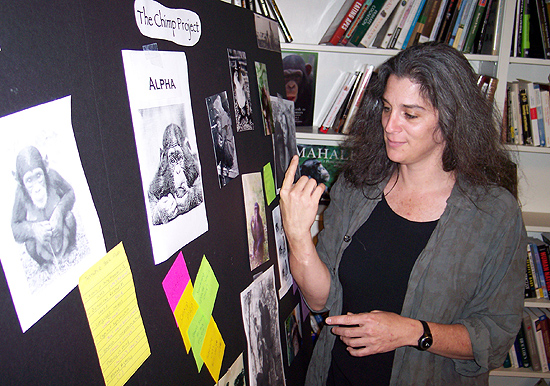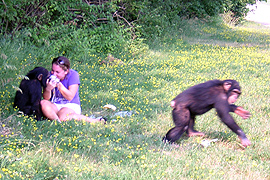Gruen Researches Empathy, Ethics and Chimpanzees, Philosophically
 |
 At top, Lori Gruen, associate professor of philosophy, explains “The Chimp Project” from her office in Russell House. She and Hughes Fellow Shayla Silver-Balbus ’06 (pictured at left) studied chimpanzees in Ohio this summer. At top, Lori Gruen, associate professor of philosophy, explains “The Chimp Project” from her office in Russell House. She and Hughes Fellow Shayla Silver-Balbus ’06 (pictured at left) studied chimpanzees in Ohio this summer. |
| Posted 10/01/05 |
| Lori Gruen spent this past summer with curious students of an unsuspecting kind chimpanzees named Emma and Harper. Gruen, an associate professor of philosophy and co-chair of the Wesleyan Feminism, Gender and Sexuality Studies Department, formally known as the Womens Studies Department, studied the chimpanzees at the Ohio State University Chimpanzee Center where she continues to gather information for an upcoming book on empathy.
By exploring our attitudes and relationships with chimpanzees we can enhance our capacity to empathize with different others and get a glimpse at how empathy might have evolved, says Gruen. Gruens book will focus on, among others topics, chimpanzee history, sign language skills, comparative cognition and emotional and ethical intelligence. Gruen plans to continue working on the new book during her upcoming spring sabbatical. This is an opportunity for me to move away from practicing pure philosophy, she says. This is a feature of being engaged in the world. Whether in the field with chimpanzees or in the classroom with students, Gruens academic work always involves ethics. In her classes, one of which includes the popular Reproduction in the 21st Century, she asks that her students challenge their life choices. Co-taught with Laura Grabel, professor of biology and Fisk Professor of Natural Sciences, Reproduction in the 21st Century, focuses on such hot button issues as the ethics of cloning, stem cell research, infertility, contraception and abortion. Offered for the first time last year, the class is again at it 65 student capacity. Gruen says an additional 130 students were on the waiting list. Grabel says that a previous incarnation of the class was taught without a real ethics component and that Gruens insights have brought a whole perspective to the scientific information thats presented. Lori has brought that missing piece to the course, Grabel says. She can teach the rich intellectual history of the philosophical field of ethics and teach students how to apply these concepts to crafting strong ethical arguments relevant to reproductive issues ranging from cloning to abortion. Much like in Reproduction in the 21st Century, whose subject matter often attracts the local and national media, Gruen longed to weave ethics into other classes across campus. This past summer she helped launch Wesleyans Ethics in Society Project, a similar program to the one she launched at Stanford University before coming to Wesleyan in 2000. The project awards Ethical Reasoning Capability Summer Development Grants to six Wesleyan professors who are responsible for incorporating ethics into their undergraduate curriculums. The grant recipients for this year include: Christina Crosby, English for a course “Questions of Embodiment”; Norman Danner, Computer Science for “Cryptography”; Indira Karamcheti, English for “Postcolonial Literature”; Elizabeth McAlister, Religion for “Christianity and Globalization”; Sheila Mullen, Less Commonly Taught Languages for “American Sign Language and Current Issues” and Suzanne O’Connell, Earth &Environmental Science for “Introduction to Environmental Science”. The Ethics in Society Project grants will be available to Wesleyan faculty again at the beginning of spring semester as well. For more information, visit www.wesleyan.edu/ethics. Wesleyans commitment to interdisciplinary work is great for students and myself as a scholar, says Gruen. Its important to be able to think deeply and broadly about challenging issues. My students always want to learn how to respond to the world around them, all while keeping ethics in mind. |
| By Laura Perillo, associate director of Media Relations |

